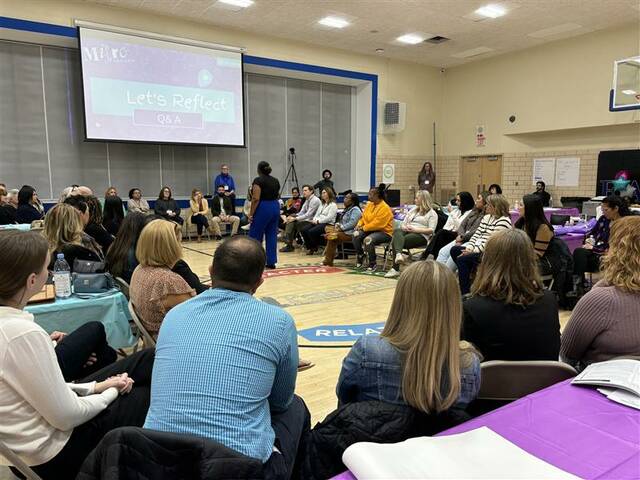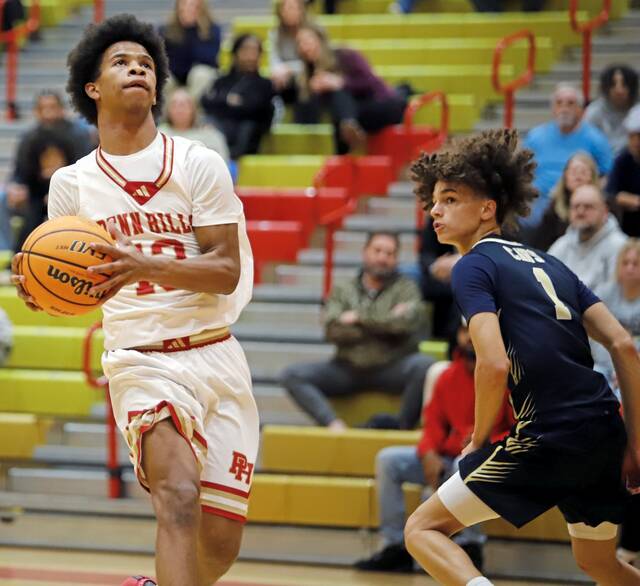More than 50 educators from 18 schools are gathering at Penn Hills Charter School of Entrepreneurship this week to talk about MicroSociety, a proprietary model where students take on the roles and responsibilities of the real world.
Students run for elected office, start their own businesses and patrol the hallways for crime.
Violators are tried in court, though PHCSE Principal Jessica Zuk admits the justices can get overzealous. There are service organizations and reporters — even an in-house currency and stock market.
It’s all part of an educational model that deemphasizes standardized tests and prepares students for life beyond school, according to Carolynn Richmond, president and CEO of MicroSociety.
“If you want children to be able to run the world, you need to give them a world to run,” Richmond said.
PHCSE is hosting the 30th annual MicroSociety Conference from March 20-22, bringing together representatives from schools that use or are interested in the model for speakers, workshops and demonstrations.
Founded in 1991, MicroSociety licenses its curriculum to schools in four countries: the U.S., Canada, Colombia and Britain by way of Bermuda. It contracted with about 150 schools pre-pandemic, though that number has since changed.
At its peak in the late 1990s and early 2000s, about 350 schools used the MicroSociety model.
“That’s when the standards movement took over,” Richmond said, referring to policy moves such as the No Child Left Behind Act of 2001. “We’re learning as a country from some of those mistakes.”
As MicroSociety lost schools to the standardization movement, the nonprofit began liscensing the model. Its representatives couldn’t offer an average price tag, noting it depends on a district’s size and needs, but said the greatest costs are incurred during an initial three-year training period.
PHCSE has used MicroSociety since it opened in 2011, and Richmond described the school as “steadfast” in its commitment to the model. It also has been chosen as one of three pilot schools for MicroSociety 2.0, a digital platform that offers students experience in technology jobs such as web developer and data analyst.
MicroSociety has been so popular, in fact, that students complain about early dismissals for doctor appointments, according to Nina Tortorice, MicroSociety coordinator for PHCSE. Most schools have either a dedicated coordinator or a teacher doubling as the role.
“That’s when you know it’s making a difference,” Tortorice said.
The nonprofit is actively recruiting other schools in Western Pennsylvania, according to Riva Richmond, content and development director at MicroSociety.
McKeesport School District might take them up on it, according to Ralph Gioia, assistant principal at Founders’ Hall Middle School. A partnership is far from final, but Gioia said the model could help engage students and promote attendance.
Funding could prove prohibitive for schools looking to make the switch, especially for cash-strapped public districts like McKeesport.
Riva Richmond said MicroSociety works with “every kind of school,” but charters “have the kind of flexibility to work with our model.” For all schools, she noted, it also can be challenging for teachers to turn over more power to their students.
Another benefit of MicroSociety, according to its proponents, is the ability to tailor the curriculum to a community’s needs. Take Stenstrom Elementary School, located near Orlando, Fla., for example. It has used the model for three years, according to Jake Novak, the school’s principal.
Novak said his students are learning to empathize with opposing viewpoints and navigate conflicts, such as a constitutional crisis where an election resulted in a tie. That’s especially important in a state where officials have banned books and curriculums that don’t align with their politics.
“We’ve lost that, ‘Let me put myself in your shoes,’ ” Novak said. “These are all things our kids need to be able to do. Otherwise, we’re in trouble.”








